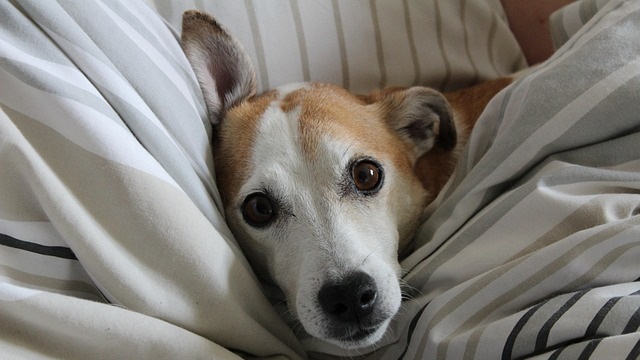Why Is My Dog Peeing on My Bed? Causes and Fixes (Vet Verified)
One moment your dog is normally peeing on the street, then you find a yellow puddle in your bed sheets. “But why is my dog peeing on my bed”, you may wonder?
The cause falls into one of two main categories: medical or behavioral. Your bed, because it holds your strongest scent, is a special location for your dog. For different reasons, both physical and psychological, this is why they often target it when they have an accident.
Key Takeaways
- Your dog isn’t getting back at you, this behavior is usually a plea for help.
- Both medical and behavioral issues can lead your furry friend to pee on your bed.
- A pet health tracker can help you and your vet move beyond guesswork by tracking subtle changes in your dog’s rest and activity patterns, which are key indicators of hidden health or stress issues.
Why Is My Dog Suddenly Peeing on My Bed?
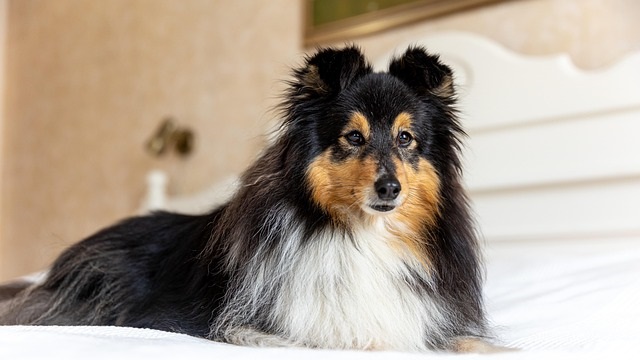
Dogs are creatures of habit, so a sudden change in house-training habits is a strong indicator of medical issues and requires an immediate visit to the vet.
Common medical causes behind a sudden change include:
- Urinary Tract Infections: Inflammation and pain lead to a frequent, urgent need to urinate, often resulting in accidents.
- Urinary Incontinence: Involuntary leaking of urine can affect any dog, making them pee wherever is nearest and comfortable.
- High Water Intake: Conditions like diabetes and kidney disease cause your dog to drink excessive amounts of water, overwhelming their bladder.
- Bladder Stones: These can cause inflammation, pain, and a feeling of urgency similar to a urinary tract infection.
- Dog Dementia: In senior dogs, a sudden lapse in house training can be due to confusion or forgetting their learned behaviors and where they should eliminate.
“I got the Maven sensor for my 14-year-old Chihuahua mix with heart and trachea issues. It gave me back peace of mind – I can track her RRR, BPM, drinking, and activity anytime and know instantly if something’s wrong. Highly recommend!”

★★★★★
Chiara De Luca
Titti
Why Is My Dog Peeing on the Bed? (Common Causes)
Once medical causes have been ruled out by your vet, it’s time to look for behavioral/emotional issues.
- Separation Anxiety: Peeing on the bed is a coping mechanism, as your bed is a source of comfort for your pet. This often looks like urination happening only when you are gone, sometimes paired with destructive chewing, pacing, or excessive vocalization.
- Territorial Marking: If your dog urinates small amounts in several, they might be marking territory.
- Stress or Fear: A recent change (new home, new pet, new routine, or loud noises like fireworks) can cause profound anxiety that results in inappropriate urination.
- Incomplete House Training: Your dog may have learned to associate soft surfaces (rugs, dog beds, and your bed) as acceptable places to eliminate, especially if they were initially trained using pee pads. In this case, the dog may pee on other soft surfaces in the house, not just the bed.
Behavioral vs. Medical Reasons for Bed Peeing
It’s important to distinguish between behavioral and medical reasons for house soiling.
Signs of a medical issue:
- The behavior is sudden and a rapid change.
- The dog is unaware or asleep when it happens (incontinence).
- The urine volume is often large (incontinence) or very frequent small amounts (urinary tract infection).
- Other symptoms include increased thirst, lethargy, straining to urinate, or blood in urine.
Signs of a behavioral issue:
- The behavior develops over a period of time (not usually a sudden change).
- The dog is aware they are peeing but is doing so due to anxiety, marking, or poor training.
- The urine is often a small volume (marking) or a normal amount if due to anxiety/lack of training.
- Other symptoms include pacing, whining when left alone, destruction, or fearful body language.
What to Do and How to Stop It
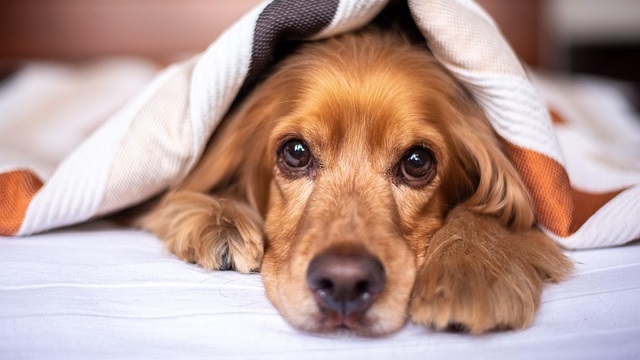
1. Consult Your Vet
The most important step is to rule out a medical issue. Your vet will perform a physical exam and likely run tests (urinalysis, blood work) to check for UTIs, diabetes, kidney issues, or other causes of incontinence.
2. Manage the Environment
- Restrict bed access when you can’t supervise.
- Use an enzymatic cleaner (not ammonia-based) specifically designed to break down the proteins in urine. If the odor remains, your dog will be drawn back to the spot.
- Wash all bedding in hot water.
3. Implement a Strict Potty Routine
- Take your dog out more frequently, especially right before bedtime and immediately upon waking.
- Go outside with your dog. When they eliminate, praise them and give them a treat they love. This positive reinforcement solidifies where they should go.
4. Address Anxiety and Stress
If your vet has ruled out medical issues and suspects anxiety, work on the root cause:
- Use enrichment toys when you leave, practice short-duration absences, and consult with your vet about behavior modification training or anxiety-reducing supplements/medications.
- If your dog is marking territory, neutering/spaying can reduce this behavior significantly.
“When dogs urinate on the bed, it’s rarely out of spite. It’s often a signal of stress, insecurity, or an underlying medical issue that needs to be addressed. The most common mistake owners make is scolding the dog after the fact, which only increases their anxiety. Focus on medical exclusion first, followed by positive, consistent training and environmental management.” – Carolina Domingues, DVM, Veterinarian at Maven Pet.
How the Maven Pet Health Monitor Helps Track Health and Behavior
Addressing the question “why is my dog peeing on my bed?” relies heavily on pattern recognition. The Maven Pet Health Monitor is a dog health tracker that can provide objective data to help you and your vet.
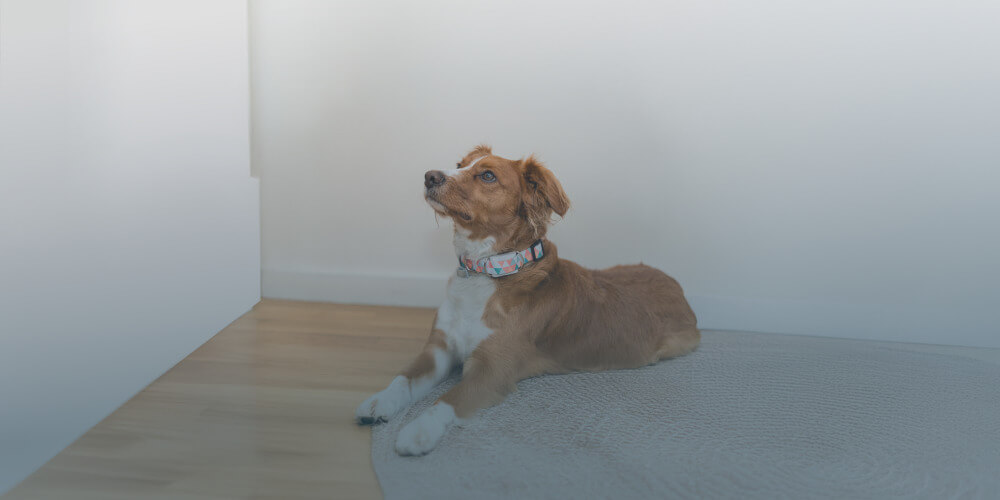
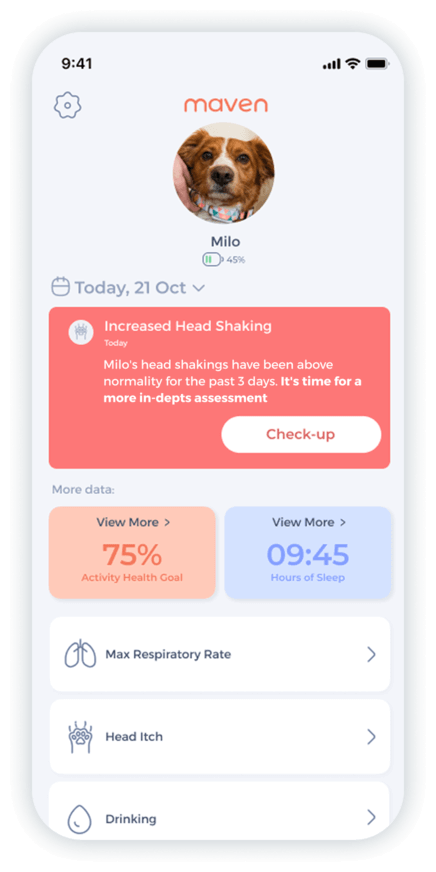
Monitor heart rate, respiratory rate, activity & rest, drinking, itch behavior.
Catching Medical Changes Early
The Maven Pet Monitor tracks key indicators that can reveal subtle shifts leading to accidents:
- Sleep Patterns: If your dog has age-related or hormone-responsive incontinence, you may notice through the pet health app that they suffer from disturbed rest.
- Activity and Bathroom Routine: An increase in daily movement combined with more frequent trips outside can indicate the excessive thirst and urination associated with conditions like diabetes or kidney disease, flagging an issue before it leads to an accident.
Identifying Behavioral Triggers
When an accident is behavioral, the monitor’s data can point to anxiety:
- Pacing and Restlessness: The pet health tracker may show a spike in activity levels or pacing during periods of separation, which is a key sign of separation anxiety.
- Environmental Stress: Monitoring can confirm if accidents correlate with specific events, such as thunder, fireworks, or when a particular family member is away.
Takeaways Recap
- A vet visit is mandatory, as sudden accidents are often due to treatable conditions like UTIs or manageable incontinence.
- Whether the cause is anxiety or poor training, the solution is a consistent, positive, and supervised potty routine, supported by clear boundaries.
- Patience, a thorough approach, and the right tools will help you resolve this issue, ensuring both your dog’s health and the cleanliness of your bed.
Maven Pet focuses on improving the quality of life of our pets with technology, using artificial intelligence (AI) to enable proactive pet care. By accurately collecting and monitoring pet data 24/7 and flagging any irregularities, Maven Pet empowers pet parents and veterinarians to stay ahead of potential health issues, ensuring the well-being and longevity of our beloved companions.

